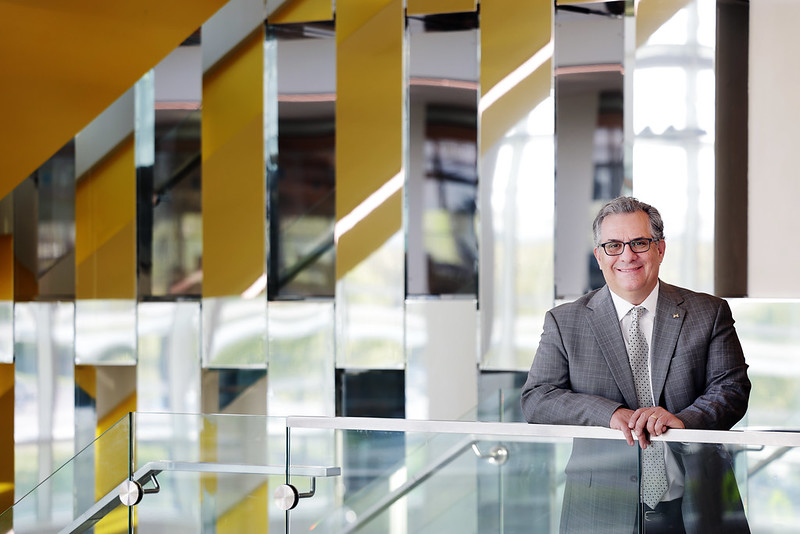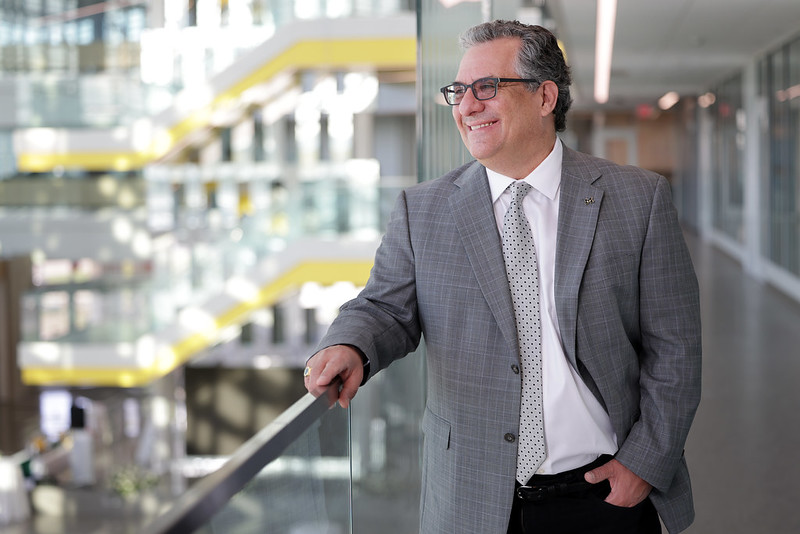
Interim dean plans for continued momentum
Steven L. Ceccio becomes interim dean following the departure of Alec D. Gallimore, who will become provost at Duke University.

Steven L. Ceccio becomes interim dean following the departure of Alec D. Gallimore, who will become provost at Duke University.
May 6, 2024 Update: Karen A. Thole, distinguished professor of mechanical engineering at Penn State, has been named the Robert J. Vlasic Dean of Engineering, effective August 1, 2024. More on Thole’s background and expertise.
Steven L. Ceccio, associate dean for academic affairs and the Vincent T. and Gloria M. Gorguze Professor of Engineering, has been appointed as interim dean of the University of Michigan College of Engineering, effective June 1, 2023.
“I am incredibly optimistic as our community looks ahead to a new chapter of College leadership and I am confident Steve will continue to serve the College well in this new role,” said Alec D. Gallimore, who served as Robert J. Vlasic Dean of Engineering, the Richard F. and Eleanor A. Towner Professor, an Arthur F. Thurnau Professor, and a professor of aerospace engineering. Gallimore is departing Michigan Engineering to become provost and chief academic officer for Duke University.
As dean, Ceccio’s priorities are to continue making progress on several key initiatives started during Gallimore’s tenure.

“Michigan Engineering has some very exciting efforts underway that are shaping the way we teach and practice engineering,” said Ceccio. “I’m very confident in the direction the College is heading, and I plan to work with our faculty, staff and students to continue that momentum.”
Ceccio points to three key areas where he hopes to see continued progress: the promotion of a people-first framework for engineering, building on successes of the new Office of Culture, Community & Equity and reinvigorating research efforts in the College.
The people-first engineering framework builds on U-M’s greatest strengths to provide a blueprint for how we aspire to teach and practice engineering. With excellent engineering fundamentals, a culture of collaboration across disciplines, and a focus on equity-centered values and global worldviews, Michigan Engineering is a place where engineers work to build a future that will elevate all people.
The Office of Culture, Community & Equity (OCCE) launched in 2022 to lead the College’s Culture pillar and serve as a hub for diversity, equity and inclusion (DEI) efforts at the College. OCCE supports a wide range of initiatives across the college, and facilitates a number important DEI related activities involving our students, faculty, and staff. A key focus will be the development of the College’s next five-year strategic plan for DEI efforts at Michigan Engineering, DEI 2.0.
In the realm of research, the College has launched several programs in recent years for investing in research internally, including the Blue Sky, Research Accelerator and Seeding To Accelerate Research Themes (START) programs. The Strategic Research Themes hiring initiative also focused on bringing in new faculty in promising new areas that align with national and global grand challenges and funding priorities. Ceccio plans to work with College faculty and leadership to continue to support these and other programs to strengthen the research enterprise.
I’m very confident in the direction the College is heading, and I plan to work with our faculty, staff and students to continue that momentum.”
Steven Ceccio
Ceccio’s own research efforts have focused on the study of multiphase flows — or the flow of fluids with other components in it, such as a fluid with gas bubbles or a gas with suspended solids — with the goal of understanding their fundamental processes and potential applications. Ceccio is a world expert in naval hydrodynamics and, in particular, cavitating flows. Cavitation occurs when flow produces regions of low pressure, leading to evaporation of the liquid into vapor. Cavitation can be deleterious to the performance of hydrodynamic systems, leading to noise and erosion, but it can also be employed to positive effect in a variety of surgical and medical procedures. Ceccio and his research group focus on experimental observations at his world-class laboratory at the University of Michigan and through the leadership of multidisciplinary research teams at large-scale testing facilities located throughout the U.S. and internationally.
He is also a fellow of the American Society of Mechanical Engineers (ASME) and of the American Physical Society. He was named the 2014 Freeman Scholar by ASME and was awarded the ASME Fluids Engineering Award in 2021.
Ceccio previously served as associate dean for research from 2017 to 2020, leading the research pillar of Michigan Engineering’s 2020 strategic vision and managing the ramp-down and ramp-up of research operations during the COVID pandemic. Prior to 2017, he was the Department Chair of Naval Architecture and Marine Engineering and the founding director of NAVSEA’s Naval Engineering Education Center.

Steve grew up in Miami, Florida, always enjoying his time at the beach or on the water. He drew inspiration from his parents. His mother, an elementary school teacher, and his father, a machinist and Navy veteran, instilled in him the values of hard work, follow-through and channeling ideas into action.
Ceccio earned a bachelor of science degree in mechanical engineering from the University of Michigan in 1985, graduating summa cum laude in just three years. He earned a master of science and doctorate degrees from the California Institute of Technology in 1986 and 1990, respectively, all in mechanical engineering. He served as a postdoctoral fellow at the California Institute of Technology and joined the U-M faculty in the Department of Mechanical Engineering as an assistant professor in 1990. He was promoted to associate professor in 1996 and to professor in 2003.
“My engineering education at Michigan opened up a world of opportunities that continue to this day,” said Ceccio. “I am grateful for the chance to support the College as our students, staff and faculty work together to pursue their goals and aspirations.”
Jennifer Judge Hensel
Executive Director, Communications & Marketing